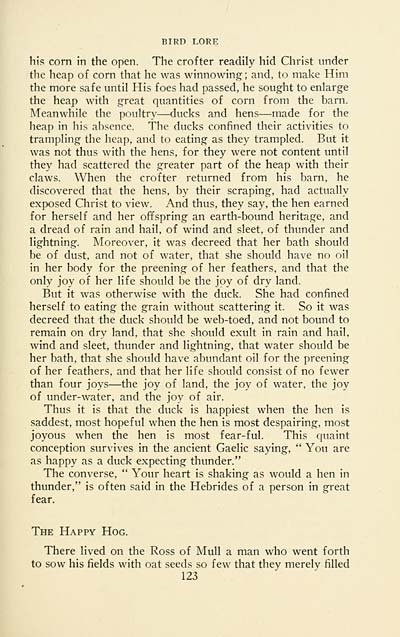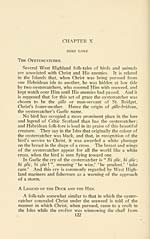Ossian Collection > Peat-fire flame
(161)
Download files
Complete book:
Individual page:
Thumbnail gallery: Grid view | List view

BIRD LORE
his corn in the open. The crofter readily hid Christ under
the heap of corn that he was winnowing; and, to make Him
the more safe until His foes had passed, he sought to enlarge
the heap with great quantities of corn from the barn.
Meanwhile the poultry — ducks and hens — made for the
heap in his absence. The ducks confined their activities to
trampling the heap, and to eating as they trampled. But it
was not thus with the hens, for they were not content until
they had scattered the greater part of the heap with their
claws. When the crofter returned from his barn, he
discovered that the hens, by their scraping, had actually
exposed Christ to view. And thus, they say, the hen earned
for herself and her offspring an earth-bound heritage, and
a dread of rain and hail, of wind and sleet, of thunder and
lightning. Moreover, it was decreed that her bath should
be of dust, and not of water, that she should have no oil
in her body for the preening of her feathers, and that the
only joy of her life should be the joy of dry land.
But it was otherwise with the duck. She had confined
herself to eating the grain without scattering it. So it was
decreed that the duck should be web-toed, and not bound to
remain on dry land, that she should exult in rain and hail,
wind and sleet, thunder and lightning, that water should be
her bath, that she should have abundant oil for the preening
of her feathers, and that her life should consist of no fewer
than four joys — the joy of land, the joy of water, the joy
of under-water, and the joy of air.
Thus it is that the duck is happiest when the hen is
saddest, most hopeful when the hen is most despairing, most
joyous when the hen is most fear-ful. This quaint
conception survives in the ancient Gaelic saying, " You are
as happy as a duck expecting thunder."
The converse, " Your heart is shaking as would a hen in
thunder," is often said in the Hebrides of a person in great
fear.
The Happy Hog.
There lived on the Ross of Mull a man who went forth
to sow his fields with oat seeds so few that they merely filled
123
his corn in the open. The crofter readily hid Christ under
the heap of corn that he was winnowing; and, to make Him
the more safe until His foes had passed, he sought to enlarge
the heap with great quantities of corn from the barn.
Meanwhile the poultry — ducks and hens — made for the
heap in his absence. The ducks confined their activities to
trampling the heap, and to eating as they trampled. But it
was not thus with the hens, for they were not content until
they had scattered the greater part of the heap with their
claws. When the crofter returned from his barn, he
discovered that the hens, by their scraping, had actually
exposed Christ to view. And thus, they say, the hen earned
for herself and her offspring an earth-bound heritage, and
a dread of rain and hail, of wind and sleet, of thunder and
lightning. Moreover, it was decreed that her bath should
be of dust, and not of water, that she should have no oil
in her body for the preening of her feathers, and that the
only joy of her life should be the joy of dry land.
But it was otherwise with the duck. She had confined
herself to eating the grain without scattering it. So it was
decreed that the duck should be web-toed, and not bound to
remain on dry land, that she should exult in rain and hail,
wind and sleet, thunder and lightning, that water should be
her bath, that she should have abundant oil for the preening
of her feathers, and that her life should consist of no fewer
than four joys — the joy of land, the joy of water, the joy
of under-water, and the joy of air.
Thus it is that the duck is happiest when the hen is
saddest, most hopeful when the hen is most despairing, most
joyous when the hen is most fear-ful. This quaint
conception survives in the ancient Gaelic saying, " You are
as happy as a duck expecting thunder."
The converse, " Your heart is shaking as would a hen in
thunder," is often said in the Hebrides of a person in great
fear.
The Happy Hog.
There lived on the Ross of Mull a man who went forth
to sow his fields with oat seeds so few that they merely filled
123
Set display mode to: Large image | Transcription
Images and transcriptions on this page, including medium image downloads, may be used under the Creative Commons Attribution 4.0 International Licence unless otherwise stated. ![]()
| Early Gaelic Book Collections > Ossian Collection > Peat-fire flame > (161) |
|---|
| Permanent URL | https://digital.nls.uk/81147991 |
|---|
| Description | Selected books from the Ossian Collection of 327 volumes, originally assembled by J. Norman Methven of Perth. Different editions and translations of James MacPherson's epic poem 'Ossian', some with a map of the 'Kingdom of Connor'. Also secondary material relating to Ossianic poetry and the Ossian controversy. |
|---|
| Description | Selected items from five 'Special and Named Printed Collections'. Includes books in Gaelic and other Celtic languages, works about the Gaels, their languages, literature, culture and history. |
|---|

